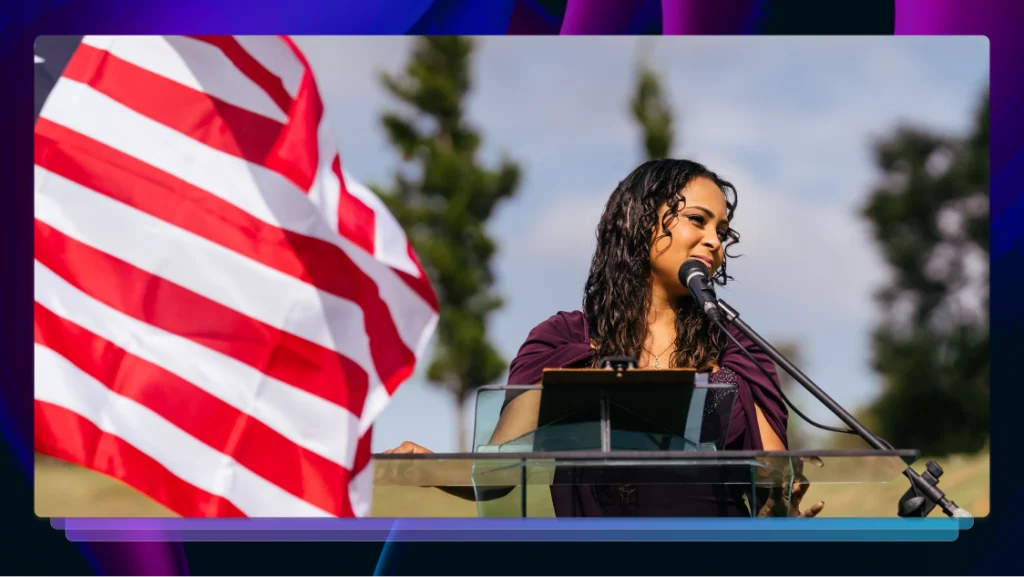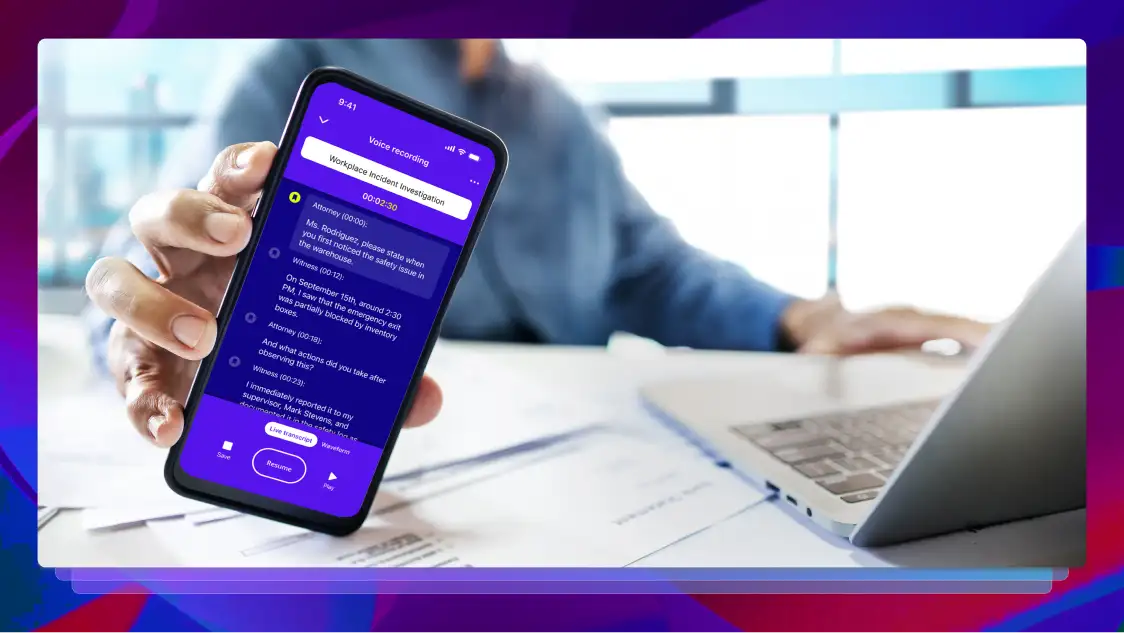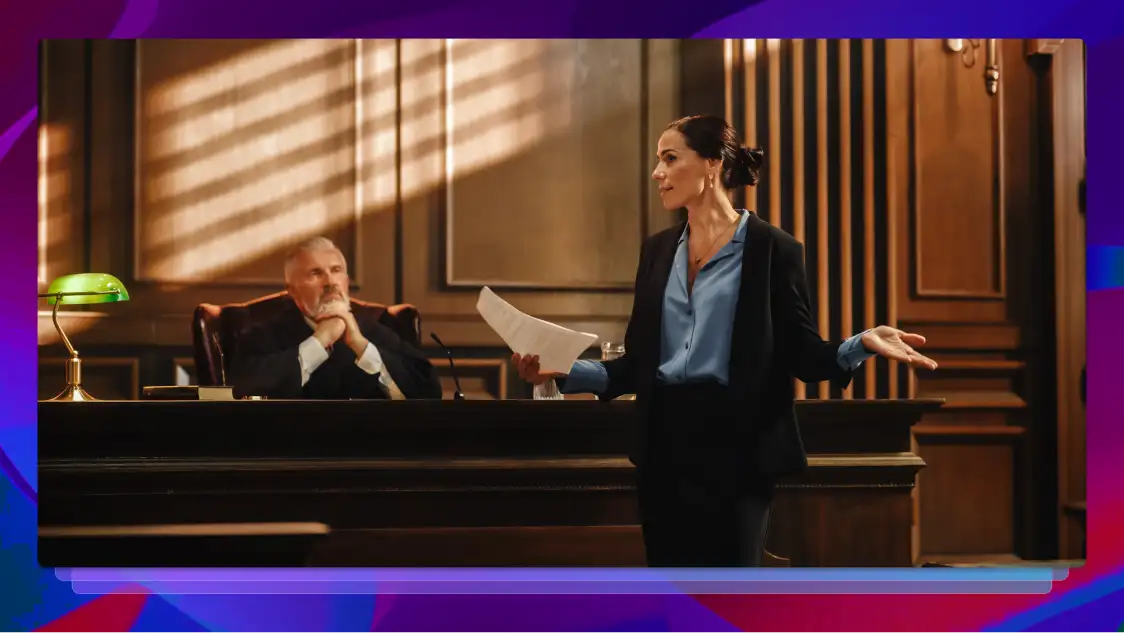4th of July Speeches You Need to Know
A great independence speech reminds us how our country began and who we are. Here are our favorite Fourth of July speeches in transcript form.

The 4th of July and stirring speeches go together like summer and swimming pools. A great presidential speech on independence day can be something truly memorable, especially if it touches on our long and complicated history with the holiday. It’s not all fireworks and parades, and we’re better when we remember how we got here.
While some people see Independence Day as a good reason to get together, have a cookout, and fire off bottle rockets, others reflect on the long, hard road we took (and are still taking) toward true independence for all. A great American speech recognizes the hard road ahead to creating a better future for every citizen while highlighting how hard our brave men and women have fought for the freedom we currently enjoy. But for a 4th of July speeches to stand the test of time (and be found online), they should be transcribed.
Here are 14 of the greatest 4th of July speeches, with links to their transcripts. Feel free to study them at length!
Looking for more inspiring speeches? Check out these famous speeches by women.
1. Frederick Douglass — “What to the Slave is the 4th of July?”
Abolitionist Frederick Douglass delivered “What to the Slave is the 4th of July?” on July 5th, 1852, in Corinthian Hall in Rochester, New York. While his speech is arguably the most famous of all speeches about freedom, Douglass pointedly discussed the fact that, 52 years after the signing of the Declaration of Independence, men and women of color were still not free.
“The rich inheritance of justice, liberty, prosperity, and independence, bequeathed by your fathers, is shared by you, not by me,” he stated before expressing hope that this would soon change.
2. Rev. Martin Luther King Jr. — “The American Dream”
The speech Martin Luther King Jr. delivered on July 4th, 1965, at Ebenezer Baptist Church in Atlanta, Georgia, isn’t his most famous speech but that doesn’t lessen its impact.
Spoken two years after his famous “I Have a Dream Speech,” King Jr. focused his Fourth of July speech on the true meaning of the Declaration of Independence and his hopes for universal freedom.
3. President Barack Obama — “4th of July Independence Day Speech”
President Barack Obama delivered this speech to members of the U.S. military at the White House on July 4th, 2014. One of our best modern-day orators focused his address on freedom, saying:
“238 years ago, our founders came together and declared a new nation and a revolutionary idea, the belief that we are all created, that we’re free to govern ourselves, that each of us is entitled to life, and liberty, and the pursuit of happiness.”
4. President Ronald Reagan — “USS John F. Kennedy Liberty Weekend Speech”
On July 4th, 1986, the 100th anniversary of France gifting us the Statue of Liberty, President Ronald Reagan boarded the USS John F. Kennedy in New York Harbor to discuss the importance of the signing of the Declaration of Independence, as well as the inherent bravery of all 56 men who signed it.
“Fifty-six men came forward to sign the parchment. It was noted at the time that they pledged their lives, their fortunes, and their sacred honors. And that was more than rhetoric; each of those men knew the penalty for high treason to the Crown.”
5. President John F. Kennedy — “1962 Independence Day Speech”
Delivered at Independence Hall in Philadelphia, Pennsylvania, on July 4th, 1962, President John F. Kennedy used his Independence Day speech to send a message about the country’s political climate at the time. He stressed the importance of strengthening the bond between the U.S. and Europe.
Saying “The United States looks on this vast new enterprise with hope and admiration. We do not regard a strong and united Europe as a rival but a partner. To aid its progress has been the basic object of our foreign policy for 17 years,” Kennedy used the past to look toward the future.
6. Patrick Henry — “Give Me Liberty or Give Me Death”
Though the speech Patrick Henry made to the Second Virginia Convention in 1775 at St. John’s Church in Richmond, Virginia, took place in March, it’s become a staple of speeches about freedom. It’s even misattributed as being given on the Fourth of July, perhaps because no other speech embodies the true meaning of the holiday like Henry’s.
He closed his speech with a powerful call to action which may have directly led to the colonists declaring war on England in the battle for independence. We’ll let the closing of his speech speak for itself.
“It is in vain, sir, to extenuate the matter. Gentlemen may cry, Peace, Peace but there is no peace. The war is actually begun! The next gale that sweeps from the north will bring to our ears the clash of resounding arms! Our brethren are already in the field! Why stand we here idle? What is it that gentlemen wish? What would they have? Is life so dear, or peace so sweet, as to be purchased at the price of chains and slavery? Forbid it, Almighty God! I know not what course others may take; but as for me, give me liberty or give me death!”
7. John Quincy Adams — “An Address Celebrating the Declaration of Independence”
The sixth president of the United States and son of founding father John Adams, John Quincy Adams gave this speech to the U.S. House of Representatives on July 4th, 1821, on the 45th anniversary of the signing of the Declaration of Independence.
“Wherever the standard of freedom and independence has been unfurled, there will [America’s] heart, her benedictions and her prayers be. But she goes not abroad in search of monsters to destroy.” The speech stresses that the Declaration was more than the “mere secession of territory” and the “establishment of a nation.”
“An Address Celebrating the Declaration of Independence” Transcript
8. Susan B. Anthony — “Declaration of Rights of the Women of the United States”
Up until now, this list has been entirely about men’s words. This is why Susan B. Anthony’s July 4th, 1876, speech resonates as much today as it did then.
One hundred years after the signing of the Declaration of Independence, Anthony and other suffragists crashed the Centennial Celebration at Independence Hall in Philadelphia to sternly point out that, while all men are created equal, that equality did not yet extend to women:
“Our faith is firm and unwavering in the broad principles of human rights proclaimed in 1776, not only as abstract truths, but as the cornerstones of a republic. Yet we cannot forget, even in this glad hour, that while all men of every race and clime and condition have been invested with the full rights of citizenship under our hospitable flag, all women still suffer the degradation of disfranchisement.”
While we’ve certainly come a long way since Anthony’s passionate speech, we still have a long way to go to guarantee equal rights for all genders.
“Declaration of Rights of the Women of the United States” Transcript
9. Daniel Webster — “An Oration, Pronounced at Hanover, New-Hampshire, the 4th day of July, 1800”
Daniel Webster was secretary of state for three different presidents, but when he gave his most famous speech on July 4th, 1800, in Hanover, New Hampshire, he was only a junior at the University of Dartmouth. His youth, however, didn’t diminish his rousing reinforcement of the importance of independence.
“But let us, who are this day free, whose hearts are yet unappalled and whose right arms are yet nerve for war, assemble before the hallowed temple of Columbian freedom and swear, to the God of our fathers, to preserve it, secure or diet its portals.”
“An Oration, Pronounced at Hanover, New-Hampshire, the 4th day of July, 1800” Transcript
10. Abraham Lincoln — “Speech at Chicago, Illinois”
We can’t have a list of speeches about freedom without mentioning Honest Abe, can we? Lincoln’s “Electric Cord Speech,” delivered on July 10th, 1858 (July 4th weekend, deal with it) in Chicago pointed to the Declaration of Independence to strengthen his argument against slavery in the United States. It’s called the “Electric Cord Speech” because of its closing:
“That is the electric cord in that Declaration that links the hearts of patriotic and liberty-loving men together, that will link those patriotic hearts as long as the love of freedom exists in the minds of men throughout the world.”
The speech must have been effective considering the American Civil War started less than three years later.
11. President Joe Biden — “Fourth of July Address”
President Joe Biden and First Lady Jill Biden welcomed military families to the White House to celebrate on July 4th, 2023. The president’s memorable speech reminded our troops of their importance to the enduring cause of freedom.
“You are the sinew, the backbone, the reality of why we’re who we are. Unbreaking. Unbending. Throughout our history, you remind us that democracy is never, never, never guaranteed. Every generation must fight to maintain it. We must always cherish it, defend it, and strengthen it.”
President Biden’s 2024 July 4th address will be transcribed on Rev, too. Stay tuned!
12. Winston Churchill — “The Third Great Title-Deed of Anglo-American Liberties”
Even non-Americans can give emotional 4th of July speeches, as British Minister of Munitions Winston Churchill proved in London on July 4th, 1918. Even though the American War for Independence was fought at the expense of his country, Churchill used the Declaration of Independence as an example for the whole world to shoot for, saying:
“The Declaration of Independence is not only an American document. It follows on Magna Carta and the Bill of Rights as the third great title-deed on which the liberties of the English-speaking people are founded.”
“The Third Great Title-Deed of Anglo-American Liberties” Transcript
13. John F. Kennedy — “Some Elements of the American Character”
In perhaps the first attempt at shouting down “the haters,” a pre-presidential JFK gave this speech during his run for Congress on July 4th, 1946. There’d been a theory circulating that the Founding Fathers were more interested in economic gain than they were in actual freedom, and Kennedy took that theory to task:
“In Revolutionary times, the cry ‘No taxation without representation’ was not an economic complaint. Rather, it was directly traceable to the eminently fair and just principle that no sovereign power has the right to govern without the consent of the governed. Anything short of that was tyranny. It was against this tyranny that the colonists fired the shot heard ’round the world.”
JFK would have been a champ on social media!
14. Joe Biden — “2020 Fourth of July Address”
Before he won the Oval Office, President Joe Biden gave a July 4th Independence Day address via video while on the campaign trail. The speech was short and to the point, but no less poignant as it came in the wake of the George Floyd riots and pointed at things to come:
“We remain locked in the battle for the soul of this nation, but believe me, truly, it’s a battle we can and we will win if we act together. Happy Fourth.”
What Was the Best Fourth of July Speech in American History?
The best Fourth of July Speech is, in our opinion, Patrick Henry’s speech. “Give me liberty or give me death,” is quite possibly as profound as speech can be. However, all 14 entries could vie for the crown due to their historical significance.
The Freedom to Preserve Your Speech
This list of 4th of July speeches is deep but far from complete. President Lincoln seemed to fire off an amazing Independence Day speech every year, and there’s a Samuel Adams speech or two out there that didn’t make our list but might make yours.
That’s the beauty of freedom; we’re able to choose what we like best and have the technology to find the great American speeches that light our own internal fireworks. But none of that would be possible without transcription.
Audio itself isn’t searchable; if you Google “Ronald Reagan 4th of July speech” you might not find any results without the actual text formats of the speech posted online. Rev is happy to play a small part in preserving American history. If you give a speech and want to make sure people find it, let us help!
Subscribe to The Rev Blog
Sign up to get Rev content delivered straight to your inbox.



